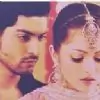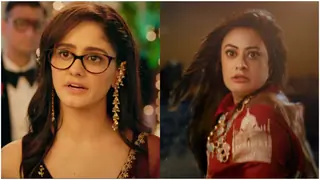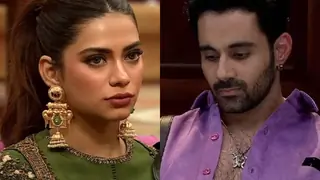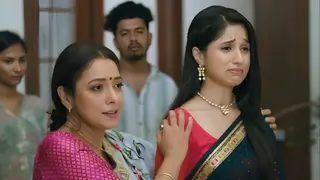Today's episode - bookended between Jodha burning the shaadi ka joda on the one hand, and the shart scene on the other - belonged, beyond the shadow of a doubt, to Jalal the Emperor. By his unruffled and effortless domination of all around him, Rajputs or Mughals, Jalal shows that he is now truly the master, and not just in his own house. He is coolly decisive, making his moves with unerring skill and a firm grasp of the psychology of the opponent, unmoved to hasty anger, with his steely gaze always fixed on his ultimate goal, to rule over all of Hindustan.
And of course checkmating Jodha and putting her firmly in her place. Underneath every move of Jalal's today, , there is a smouldering, suppressed rage against Jodha for insulting him so blatantly, and that bodes ill for her life in Agra, even if she is able to cope with the very special istaqbal (reception) he is planning for her there.
By episode end, Jalal has won hands down over Jodha, and this with all the appearance of great magnanimity, patience, and consideration for her and for hers. What he really feels is in his eyes as he leaves the hall after accepting both her conditions; she alone sees it and despairs for her future.
I am a good bit of a female chauvinist, and normally, in any such clash, I would always, instinctively, side with the woman. But not here. Jodha today let me down with a thud . She is not a tragic princess sacrificing herself on the altar of her duty, who puts her people above herself without question, as she claims earlier that she would. Instead, she is irresponsible, self-centred, and exceedingly foolish in her total lack of understanding of the consequences of her folly for her father's subjects. Instead of seeking,and finding in herself the courage to face down any odds, she wails and whimpers and feels sorry for herself.
Yesterday I had believed, and rejoiced, in the prospect of her rising above her shock and distress and making the best of the situation for the sake of Amer, while still seeking to preserve her individuality and her personal identity, religious and cultural. Today, if tens of thousands of the dead and dying in Amer did not pay with the destruction of their lives for her selfcentredness, if the terrible trio of Mahaam Anga, Adham Khan and Sharifuddin were not able to feast like vultures on the despoiled ruins of Amer, it was not thanks to Jodha.
It was rather because Jalal had the wisdom, and the self-restraint, not to let himself be stampeded into crushing Amer to salve his personal ego. Because he rates the reputation of his royal line, and his own as emperor, above such petty self-gratification. He is angry at Jodha, yes, even coldly furious, and he has every intention of paying her back. But he puts that in a separate compartment; he can look beyond that to see the broad picture, and his own place in history, and it is this that saves Amer.
It is not compassion or simple goodness of heart, not at all. Nor is it, as the romantics would undoubtedly interpret it, because he has fallen for Jodha without realizing it as yet, and he must have her at any cost, even of his pride. It is rather a calculated political move, a show of tolerance and accommodation extended to Bharmal and to Amer in the interest of the future of the Mughal dynasty in the Hindustan he seeks to unite under his aegis.
Checkmate 1: The main hall in the Amer royal family's encampment . On either side of the curtain, Jalal and Jodha are seated, facing each other. Her face is veiled , and so are her downcast eyes as she begins to speak, setting out her two sharts. At the second, Jalal springs up, his face hardening ' but is it anger at Jodha's presumption or is it shock?
He begins to pace up and down like a panther, his keen, narrowed eyes always on Jodha's face. At one point she raises her eyes and meets his, but only for a fleeting moment, while Motibai, in the background, smiles in anticipation of the success of her mistress's stratagem. Jalal does not miss either. Suddenly he stops, and begins to speak Aapki shartein bahut badi hain, shehzadi 'and he catches the tiny smile at the corner of Jodha's mouth. Par itni nahin ki Hindustan ka shahenshah Jalaluddin unhe poora na kar sake. Jodha's face crunples from the shock and her eyes brim over with sudden tears. Even her veil and the curtain combined cannot hide her misery. Jalal sits down and reiterates Aapki donon shartein hame manzoor hain, and rising, looks down into Jodha's tearful face as he sketches an aadaab for her, head bent in an exaggerated flourish of secret triumph.
Jodha, trying to outwit a master of the game, is herself outwitted when Jalal thinks two moves ahead of her. There is now no way of escape for her. The hosannas to her sung by her relieved and joyful family ring hollow in her ears. Checkmate.
Checkmate 2: Mahaam Anga is already furious. Her joyful anticipation of the destruction of Amer by an enraged Jalal has come to naught, because Jodha has, unexpectedly, agreed to the marriage. Now, with Jalal having accepted what she sees as Jodha's disgraceful conditions, Mahaam Anga's cup of fury runneth over. She scolds Jalal for his having consented to Jodha having a mandir in the Agra palace. He sits there, still and unmoved, until his patience snaps under her nagging. Hum Shahenshah hain, Badiammi. Bina kisise pooche kuch bhi kar sakte hain. Nontheless, he still explains his reasons, lucidly and with patent wisdom, but she goes on and on, now citing the kanoon of the harem that cannot be broken. That does it. He states, not in anger but with rocklike firmness, Hum jo kehte hain, wohi kanoon ban jaata hai.
Mahaam Anga realises that this is no longer the boy she could coax, cajole and control. The Shahenshah has finally arrived, and he brooks no defiance or questioning, even from his Badiammi. Checkmate.
Sheh par mat nahin: Jodha is smarting under the barely veiled barbs of Mahaam Anga while she hands over the exquisite shaadi ka joda. This worsens as she looks at all the jewellery gifted to her by Jalal, and remembers the sacrilegious depredations of the Mughal soldiers at the Kali Mandir. Her face rigid with suppressed fury, she receives the joda, but immediately flings it at a lit pedestal lamp. It catches fire and goes up in flames, as Mahaam Anga screams dire warnings and the unfortunate Mynavati, after one look at the charred outfit and Jodha's rigid face, set in acute hostility, collapses nearby.
The heedless irresponsibility of what Jodha does, and this after her mother's grave warning just minutes earlier, shows her lack of both maturity and of the courage she talks about earlier, when she claims that she would be ready to sacrifice herself for Amer. When the time comes for her to walk the talk, she is found sadly wanting, for all she can do is to weep about her maan and sammaan, and voice her hatred of Jalal, with nary a thought for the fate of Amer.
The insult to the emperor is a very grave one, but Jalal does not let that, or Mahaam Anga's vociferous complaints, echoed by Adham Khan and Sharifuddin, stampede him into war against Amer. He understands, though they will not, that a bloody and destructive military campaign by the Mughals against Amer because of this failed marriage, will make the Rajputs martyrs and besmirch his own reputation for all time to come. He too seeks revenge on Jodha, but not at this juncture, nor in this manner.
So it is sheh for Jodha when she defiantly sets fire to the shaadi ka joda, but Jalal prevents it from becoming mat.
Jodha: Even after this narrow escape for Amer, Jodha still cannot see the big picture, but only her need to avoid this hateful marriage at any cost. So she schemes again, this time to get Jalal to back out of the marriage by making what she thinks are impossible demands on him.
What she forgets is that even if he does drop the idea, and does not attack Amer to take revenge, Bharmal and Amer would be back in the same parlous plight in which they were before Chughtai Khan took Bharmal to meet the Shahenshah. Sharifuddin would again have squeexed Amer dry under the thread of destruction in a mukammal jung, and then annexed it when the royal treasury was bankrupt. That her ploy fails, and this sad prospect along with it, is another matter altogether.
Bharmal was criticized yesterday for seeming unfeeling towards Jodha's shock and distress, and worrying much more about Jalal's reaction to her running away from the muhdikhayi. But one has to see things from Bharmal the Raja's point of view. Jodha agreed, voluntarily, to make whatever sacrifice was called for from her to save Amer, and it was she who stops him from revealing the name of her husband to be. I agree that he should have persisted and broken the news to her later. But he does not, and now things are at the DDay-1. At this stage, he cannot afford any breakdown, which will inevitably lead to Jalal waging mukammal jung and destroying Amer. Seen against this, to him, Jodha, however much he loves her, is dispensable. And I would agree with the otherwise stupid man on this,
Jodha, after all those grand statements of being ready to do anything for Amer, should now have tried to get over the shock and also tried to understand what was at stake and acted accordingly. Instread she seems to have forgotten all about that promise of hers and is busy bemoaning her fate. In fact, the way she behaves at first, till her mother reads her the riot act, justifies the deception her family practiced, something that I had criticized sharply in an earlier post. Now I am not so sure.
Plus, for a Rajput princess, Jodha seems to have very little understanding of the ground realities of political and military power. Or of the real strength of the Mughals. If she did, she would not be dreaming of getting a husband who could defeat Jalal. Does she even wonder how this supposed veer could get her brothers freed by the Mughals? No, she does not. She sees nothing but what she wants to see.
In Rajput royal families like Jodha's, the sons and daughters are expected to put their duty to their people first, above themselves, and this is what Jodha pledges to do. Now it is delivery time, and she finds it tough. I can understand that, for it is normal human weakness. But what I cannot understand is her sparing not a single thought for her beloved Amer.
Bharmal has his faults, but in this case , he is in such a tight situation that he cannot indulge Jodha in her hesitations and her revulsion. But he still looks shamefaced, and he still gives her a choice. Most other fathers in that age would not have done any of that. They would have demanded, and got, implicit obedience, and frogmarched their daughter into the marriage, however unpleasant it might be, for their subjects would have to come first, always and every time.
Of course, this critique is of Jodha the character, not of Paridhi the actress , who does a very good job of it today too, and continues to look gorgeous. But it was Jalal's show all the way, and of course of Rajat's superb, controlled take on him, characterized above all by tehraav and a gravitas beyond his years.
Shyamala B.Cowsik
PS: The precap seems to be another of Jodha's hiccups, that is all, and so not worth bothering about.






































20